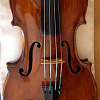We have thousands of human-written stories, discussions, interviews and reviews from today through the past 20+ years. Find them here:

March 2009
V.com weekend vote: How is the economy affecting you?
March 27, 2009 17:16
Misery loves company, and I believe we're all in good company these days, when it comes to the economy. The stories are everywhere: orchestras asking musicians to play for free, artists reducing their fees, people losing their jobs, students quitting due to financial problems, financial aid drying up, teachers receiving pink slips, concerts being canceled.
Are you carrying around a bag of worries? Well, unload for a moment, check all the problems that apply, and we shall commiserate. We'll use the comments below to vent, gripe, and try to encourage each other.
V.com weekend vote: Can you sing, or speak, while playing?
March 20, 2009 12:21
Last week, I asked if you can sing, and most people said they could, though some had better voices than others. But one reader mentioned that his job involved singing while playing, doing backup vocals and such.
Singing while playing!
Not so unusual; guitarists and pianists seem to do this with frequency and ease. But despite the fact that we violinists don't need our mouths to make our instruments speak, we don't all sing while playing. In fact, some of us probably don't even breathe while we're playing!
And that brings me to talking while playing. A friend of mine who is a Suzuki teacher trainer advises aspiring teachers that they'd best learn to speak while playing. It's a great skill to have.
Personally, I find it rather hard to sing or speak while playing, but I probably should learn. To be honest, I usually mess up: either I jumble the notes or I jumble what I'm saying.
So I'd like to include both singing and speaking in this week's poll: Can you speak and/or sing while you are playing your violin? If so, what do you use this skill for? And how did you cultivate it, or were you simply born with the ability to do high-level multitasking?
V.com weekend vote: Can you sing?
March 13, 2009 20:14
Hey this is a violin website, why are you asking me if I can sing?
I sometimes joke that "I have no voice, that's why I had to take up the violin..." It's not entirely true; I have a voice, I sing in tune, and I've even sung in a number of choirs -- at the back of the altos. I confess to singing in the car and in the shower as well. But if you asked me to sing the solo in church on Sunday (and you wouldn't), I would run away in a panic. Give me my violin, if you want to hear my voice!
Of course, as a child I loved to sing -- I'm a musician! I sang every song I heard, and I listened at every possible opportunity. I hummed, I whistled...honestly, I still do. I also encourage students to sing.
However, I no longer believe that those who can't or won't sing are not musical, as I used to. I've met a number of excellent musicians who don't really sing, for various reasons: shyness, a weak or untrained voice, etc.
Where do you stand on this issue? Can you sing? Do you sing?
Here are some thoughts on the matter from a good man, Bob McGrath, whom I saw riding in the Rose Parade here in Pasadena this year. I got to play with him back in the last millennium, when I was in the Disney College Orchestra. Sing it, Bob! :)
V.com weekend vote: How often do you play scales?
March 6, 2009 18:19
Scales.
Love 'em or hate 'em, we usually run up against someone who wants us to play one at some point in becoming a violinist.
Having studied with several Galamian proteges, scales (and arpeggios) have long been a part of my practice diet; I always warm up with them and sometimes spend a very, very long time playing and perfecting this or that. My students can also attest that I'm carrying on in the old Galamian acceleration scale tradition.
But why continue to do something so boring, for years upon years?
For one, I don't find them boring; there is much to keep my attention. Regular scales, played with attention to intonation and perfect shifting, train the hand to keep its shape and the fingers to know their place, in any position. Just about any bowing on earth can be applied and improved by taking it up and down a scale.
There is another argument, that scales dull one's senses, taking the focus off music and putting it on something purely technical. Or that an etude is better for warming up than a scale.
What are your thoughts on scales? And how often do you practice them?
More entries: April 2009 • February 2009











